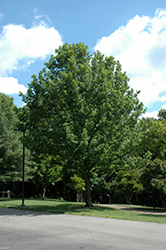It's all about ...
plants

Height: 50 feet
Spread: 40 feet
Sunlight:
![]()
Hardiness Zone: 5a
Description:
A decidedly aristocratic tree with a pyramidal to oval habit of growth from youth to old age, upturning branches that require little maintenance pruning; as a native of swampy sites it tolerates periodic flooding and wet locations but quite adaptable
Ornamental Features
Overcup Oak is primarily valued in the landscape for its distinctively pyramidal habit of growth. It has dark green deciduous foliage. The glossy lobed leaves turn an outstanding harvest gold in the fall. However, the fruit can be messy in the landscape and may require occasional clean-up.
Landscape Attributes
Overcup Oak is a deciduous tree with a distinctive and refined pyramidal form. Its average texture blends into the landscape, but can be balanced by one or two finer or coarser trees or shrubs for an effective composition.
This tree will require occasional maintenance and upkeep, and should not require much pruning, except when necessary, such as to remove dieback. It is a good choice for attracting squirrels to your yard. Gardeners should be aware of the following characteristic(s) that may warrant special consideration;
- Messy
Overcup Oak is recommended for the following landscape applications;
- Shade
Planting & Growing
Overcup Oak will grow to be about 50 feet tall at maturity, with a spread of 40 feet. It has a high canopy with a typical clearance of 6 feet from the ground, and should not be planted underneath power lines. As it matures, the lower branches of this tree can be strategically removed to create a high enough canopy to support unobstructed human traffic underneath. It grows at a medium rate, and under ideal conditions can be expected to live to a ripe old age of 100 years or more; think of this as a heritage tree for future generations!
This tree should only be grown in full sunlight. It is quite adaptable, prefering to grow in average to wet conditions, and will even tolerate some standing water. It is not particular as to soil type or pH. It is somewhat tolerant of urban pollution. This species is native to parts of North America.
This plant is not reliably hardy in our region, and certain restrictions may apply; contact the store for more information.
